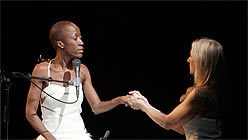Enthusing about the new production on the phone from France, Sellars told me that the idea was born of a challenge he put to Toni Morrison over lunch one day, “I happened to mention that there’s a very bad play by Shakespeare called Othello that makes no sense, the characters are not plausible and that Shakespeare never knew any Africans.”
“Toni spent the next four hours telling me how wrong I was and quoting the play from memory, saying it was one of the great plays, particularly for our time, because it’s not about how they kill what you love, it’s about how they convince you to kill what you love,” said Sellars.
For Sellars, this really sharpened his thoughts about race in America. His 2009 Othello, (starring Phillip Seymour Hoffman as Iago) about “a Black man who had risen to the highest level in power in history,” was being performed just as extreme racism towards the new American President was becoming apparent.
Sellars said he challenged Morrison to respond to Shakespeare, “to reply to some of the things that really still need to be dealt with in Shakespeare. And she decided to begin with the women.”
A largely overlooked line in Act IV of Othello has become the key ingredient in Morrison’s play. Desdemona, who has already been threatened by her husband, sings a melancholic song and says, “I learned it from my maid, Barbary, who died while singing it from a broken heart.”

“To use the name Barbary is a deliberate provocation,” says Sellars. In 16th century England, Barbary meant Africa and so this line “leads you to this astonishing thing — that Desdemona was raised by an African woman.”
Morrison and Sellars interpret this iota of the character’s backstory as a window into Desdemona’s heart, a means to understand her in a deeper way; to understand her affinity with an African man. “She knows him,” Sellars explains. Desdemona was raised by an African woman with African stories and African songs. “When Othello starts telling her stories, she knows those stories.”
In The Desdemona Project, Morrison tells the stories that Othello had told Desdemona, the stories that, as she tells her father in Act I, made her fall in love with Othello. And we meet Barbary, Desdemona’s maid. They meet on the other side of the grave.
Malian singer-songwriter Rokia Traoré sings the role of Barbary and has written the music for the production. An award-winning and acclaimed musician and singer, she and Morrison collaborated, exchanging text and song from New York to Mali and back, over the internet.
On stage, both Barbary and Desdemona get to say their piece. “Toni says, for the dead the past and future are the same,” said Sellars. “So she let these women speak. Both retrospectively and also prophetically.”
The Desdemona Project runs October 26-29, 2011 at The Zellerbach Playhouse in Berkeley. For tickets and information visit calperformances.org.



